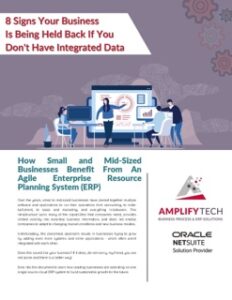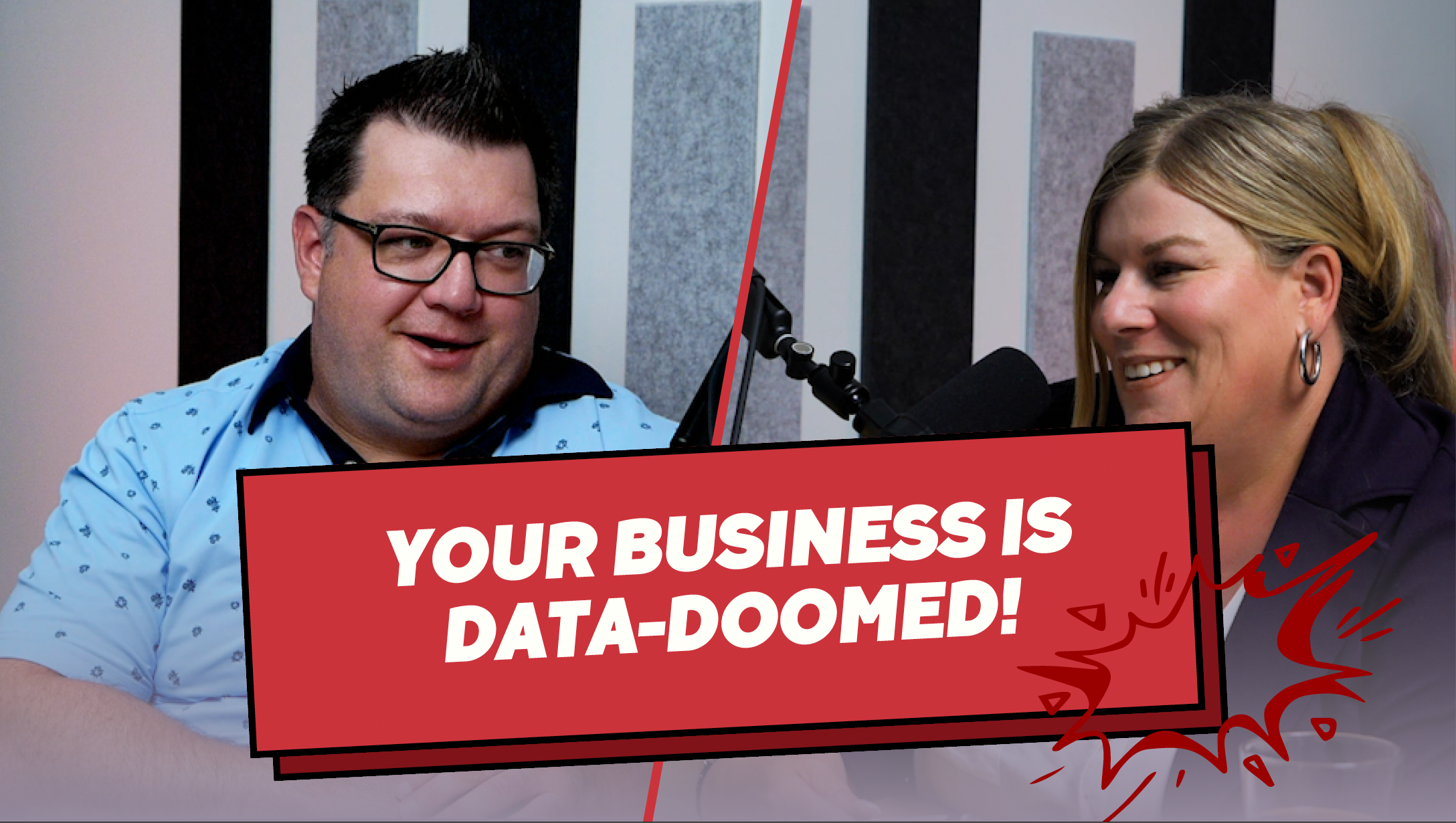Watch
Listen
Read
For a more in depth Discussion on 8 Signs Your Business Is Being Held Back If You Don’t Have Integrated Data, Download our E-Book!

Blog
In today’s fast-paced business environment, growth and innovation are at the forefront of success, yet they present their unique challenges. When you are scaling a business handling rapid change, aligning operational teams, enhancing customer segmentation, or preparing for market expansion demands agility and precision.
Enter the ERP (Enterprise Resource Planning) systems, where seamless integration, functionality, and tailored solutions come together to support various aspects of business growth.
But how does a business know when it’s time to embrace an ERP system?
It could be a question of scaling up processes, finding custom solutions, improving sales, or managing information effectively to lead growth.
This blog will explore the eight critical signs that indicate a company might be ready for an ERP system. Each sign is a gateway to understanding the broader impact and benefits that an ERP system can offer, ensuring not just immediate cost-efficiency but a strategic alignment with long-term goals and visions.
It’s more than a technological advancement; it’s a pivotal step towards shaping the future of your organization.
Your Business is Growing Quickly
Rapid growth can quickly overwhelm existing systems and processes. This is where ERP systems like NetSuite can play a vital role. By offering seamless integration and functionality, such systems can handle the growth in various areas, including consolidation, foreign exchange, and inter-company billing.
Furthermore, the ability to adapt and implement these changes within a short timeframe is a significant advantage of ERP systems. Whereas some solutions might take months, NetSuite can help a business go live with new functions within three to four weeks.
This kind of agility is crucial for growth-oriented companies that need to move fast to seize opportunities.
You Don’t Have Processes, People, or Automation That Has Scaled to Your Business
 Aligning operational and finance teams becomes increasingly complex as a business grows. This alignment is crucial to ensure that all parts of the business are in sync, especially when entering new jurisdictions, dealing with sales tax, and other regulatory requirements.
Aligning operational and finance teams becomes increasingly complex as a business grows. This alignment is crucial to ensure that all parts of the business are in sync, especially when entering new jurisdictions, dealing with sales tax, and other regulatory requirements.
An ERP allows businesses to align these teams in a matter of weeks, as opposed to the months it may take with other systems.
Additionally, ERP solutions provide robust functionality to meet the needs of different departments, allowing a smoother transition as the business grows. The automation and efficiency that ERP systems bring to various business processes enable teams to focus on more strategic tasks, enhancing the overall productivity of the organization.
For instance, with NetSuite, once you implement a new module, the data flows seamlessly into it. This seamless integration allows for more efficient operations and can be a significant benefit for high-growth clients launching into new markets, where the finance team often plays catch-up with operational teams.
Sales Are Lost and/or Profitability Is Slipping
When sales or profitability are on the decline, businesses must react quickly. ERP systems can provide the functionality needed to address these issues. By offering a comprehensive financial system that can handle various manufacturing and financial needs, ERP prevents unnecessary spending on customizations and consultants.
Investing in the wrong system may lead to regret and endless consulting bills.
For example, we know of a manufacturing business that was spending thousands monthly on consultants to develop software that couldn’t meet their requirements.
Systems like NetSuite prevent this scenario by offering a solution tailored to the business’s needs from the start.
Your Customer Database Is Not Segmented
Segmentation is crucial in marketing, sales, and customer service. With an integrated data system, like NetSuite’s country-specific localization bundles, businesses gain best-in-class functionality, allowing better segmentation of customer databases. This enables a more tailored approach to different market segments, improving the effectiveness of marketing strategies.
The segmentation and enhanced functionality provided by ERP systems enable businesses to adapt quickly to market changes. This ensures that customer needs are met with precision, thereby increasing satisfaction and loyalty.
You Are Preparing to Expand Your Market, Product, or Service
Expansion requires adaptation and flexibility.
ERP systems provide this through functionality like foreign exchange and inter-company billing. These capabilities enable a smooth transition into new markets, accommodating different currencies and local taxation rules.
The speed of adaptation is a standout feature of ERP systems. Quick implementation is vital when entering new markets or launching new products, and ERPs offer this advantage. This rapid responsiveness ensures that businesses can seize opportunities without unnecessary delays.
You Are Using “Old School” or Manual Data Entry
The transition from manual data entry to an automated system is a crucial step for modern businesses. Complex and inefficient systems can lead to dissatisfaction among employees, hampering productivity and morale.
With the right ERP in place the employee experience is often improved as processes are streamlined, manual tasks are reduced, and confidence in decisions increases.
This positive shift in the workplace can be a crucial factor in driving your business forward.
While the initial proposal for ERP might appear higher, the competitive comparative price point and reduced service costs make it an attractive long-term investment.
Additionally, looking beyond the initial price, the all-in-one functionality and reduced need for technical assistance and customizations create a more efficient operation. This streamlining improves overall productivity and allows employees to focus on higher-value activities.
You Need Custom Solutions to Streamline Your Business Processes
Are you finding that your current system requires endless customization and incurs high consulting fees to meet your needs? This might be a sign that your existing system is not the right fit.
Customization is often necessary for businesses with unique requirements.
ERP systems can offer tailored solutions without unnecessary extras, allowing businesses to pay for only what they need. While competitors might offer cheaper proposals with lesser functionality, ERP systems ensure you save on hidden costs.
The transparent pricing structure of ERPs, like NetSuite, offers long-term value. While the pre-built modules might be perceived as more expensive upfront, they prevent unforeseen expenses and can save significant costs with competitors that will require more customization in the long term.
This results in more accurate budgeting and financial planning, allowing businesses to focus on their core activities without worrying about unexpected costs.
Your Management, Executives, and Board Need Information to Lead Growth
 Leadership requires robust information and analytics. ERP systems provide tools and insights needed by management, executives, and boards to lead growth effectively. Analyzing costs over a longer period, ERPs offer value by minimizing hidden costs, such as service and customization.
Leadership requires robust information and analytics. ERP systems provide tools and insights needed by management, executives, and boards to lead growth effectively. Analyzing costs over a longer period, ERPs offer value by minimizing hidden costs, such as service and customization.
More than just numbers, ERP systems assist in achieving business growth goals and focusing on what really matters for the business.
A strategic approach that looks beyond price to assess overall ROI enables smarter decisions. This includes considering factors such as revenue growth, cost reduction, and job satisfaction, turning technology into a tool for genuine business growth.
Conclusion
Choosing an ERP system goes beyond a mere transaction or an immediate cost-benefit analysis. It’s about taking a holistic view that considers your overall business strategy, growth plans, and long-term vision.
By recognizing these eight signs, businesses can invest in an ERP system, enhancing their growth, improving efficiency, and providing returns that impact not just the financial bottom line but also qualitative factors such as employee satisfaction.
The right ERP system can be a strategic business decision that sets the stage for success, scalability, and innovation in today’s fast-paced business environment.
It’s not merely a software solution; it’s an investment in the future of your organization.
SUBSCRIBE to our YouTube channel – LETs with Amplify
Get the latest on business leadership delivered to your inbox every week!


Leave A Comment
You must be logged in to post a comment.